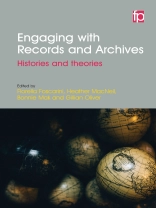This collection provides a multifaceted response to today’s growing fascination with the idea of the archive and showcases the myriad ways in which archival ideas and practices are being engaged and developed by emerging and internationally renowned scholars. Engaging with Records and Archives offers a selection of original, insightful and imaginative papers from the Seventh International Conference on the History of Records and Archives (I-CHORA 7). The contributions in this volume comprise a wide variety of views of records, archives and archival functions, spanning diverse regions, communities, disciplinary perspectives and time periods. From the origins of contemporary grassroots archival activism in Poland to the role of women archivists in early 20th century England; from the management of records in the Dutch East Indies in the 19th century to the relationship between Western and Indigenous cultures in North America and other modern archival conundrums, this collection reveals the richness of archival thinking through compelling examples from past and present that will captivate the reader.
This book will be useful reading for both scholars and practitioners, including archivists, records managers and other media and information professionals. Bridging archival, information, and library science; the digital humanities; art history; social history; culture and media studies; data curation; and communication, students and researchers across the disciplines are sure to find inspiration.
Зміст
Introduction – Fiorella Foscarini, Heather Macneil, Bonnie Mak, and Gillian Oliver PART 1: RETHINKING HISTORIES AND THEORIES 1. Moving the Margins to the Middle: Reconciling ‘the Archive’ with the Archives – Jeannette Bastian
2. Organisms, Skeletons, and the Archivist as Paleontologist: Metaphors of Archival Order and Reconstruction in Context – Juan Ilerbaig
3. ‘Records in Context’ in Context: A Brief History of Data Modeling for Archival Description – Jonathan Furner
4. Mapping Archival Silence: Technology and the Historical Record – Marlene Manoff
5. Hidden Voices in the Archives: Pioneering Women Archivists in Early 20th Century England – Elizabeth Shepherd PART 2: ENGAGING RECORDS AND ARCHIVES 6. The Use and Reuse of Documents by Chancellors, Archivists and Government Members in an Early Modern Republican State: Genoa’s Giunta dei Confini and Its Archives – Stefano Gardini
7. The Bumpy Road to Transparency: Access and Secrecy in 19th-Century Records in the Dutch East Indies – Charles Jeurgens
8. Archival Ethics and Indigenous Justice: Conflict or Coexistence? – Melanie Delva and Melissa Adams
9. History and Development of Information and Recordkeeping in Malawi – Paul Lihoma
10. History of Community Archiving in Poland – Magdalena Wiśniewska
11. Reflecting on Practice: Artists’ Experiences in the Archives – Sian Vaughan
Про автора
Fiorella Foscarini Ph D is an associate professor in the Faculty of Information at the University of Toronto. She taught previously at the University of Amsterdam and holds a Ph D in archival studies from the University of British Columbia in Vancouver. Prior to joining academia, she worked as senior archivist for the European Central Bank in Frankfurt am Main, Germany. She is particularly interested in the nature of records and the activities that shape and are shaped by records. She is Co-editor in Chief of the Records Management Journal. Heather Mac Neil Ph D is a professor in the Faculty of Information at the University of Toronto where she teaches courses in the areas of archival theory and practice and the history of record keeping. Her research and publications focus on the theory and methods of archival arrangement and description, the trustworthiness of records in analogue and digital environments, and archives and archival finding aids as cultural texts. Bonnie Mak Ph D is an associate professor at the University of Illinois, jointly appointed in the Graduate School of Library and Information Science and the Program in Medieval Studies. She has previously held the title of Visiting Fellow at the Coach House Institute at the University of Toronto, and is currently Senior Fellow at the Center for Humanities and Information at the Pennsylvania State University. She is the author of How the Page Matters (University of Toronto Press, 2011), and teaches courses in the history and future of the book, reading practices, and knowledge production. Gillian Oliver Ph D is an associate professor at Victoria Univeristy of Wellington. Her research interests centre on organisational culture, and the influences this has on the way that information is managed. She is the co-author of Records Management and Information Culture (Facet 2014) and Digital Curation, 2nd edition (Facet 2016) and is Co-editor in Chief of the journal Archival Science.












